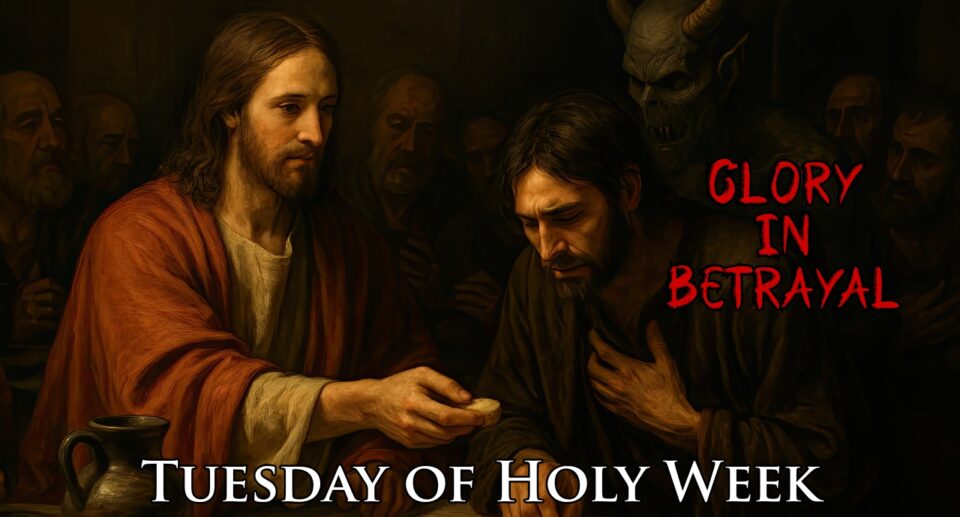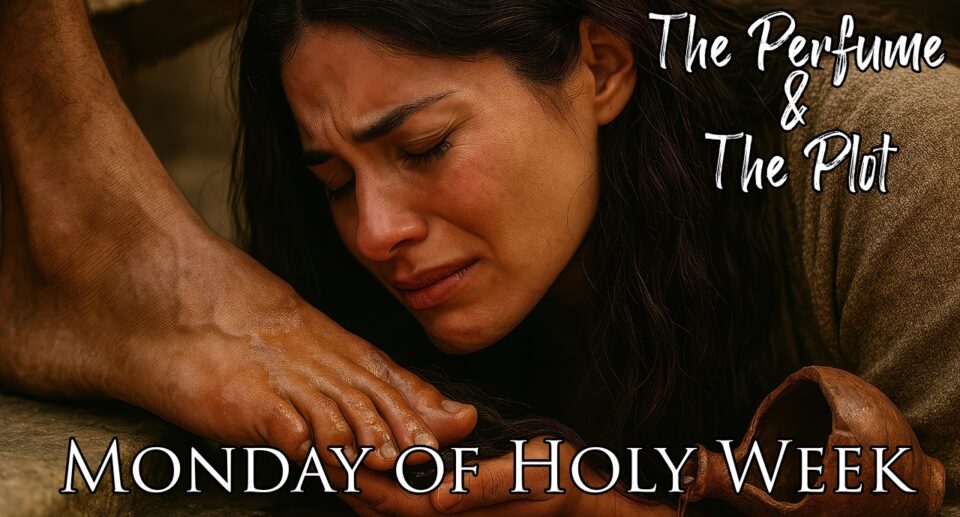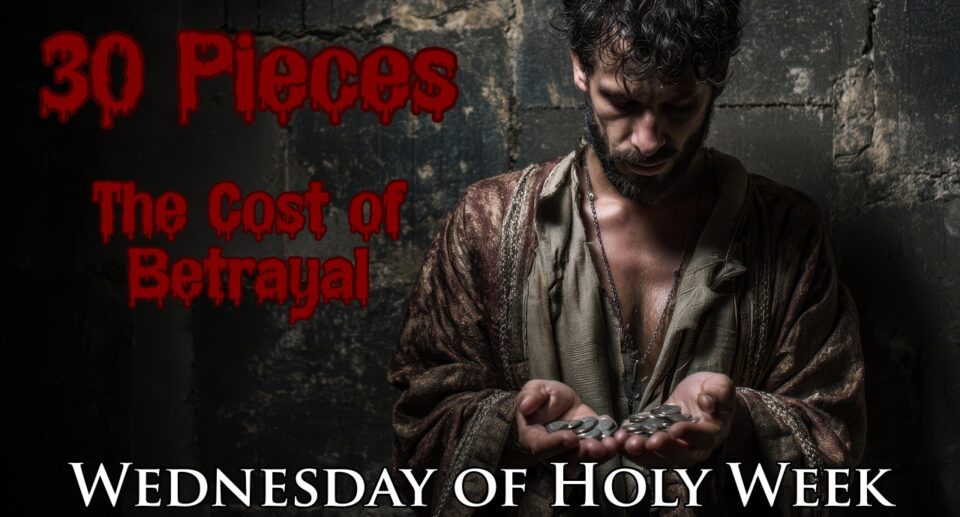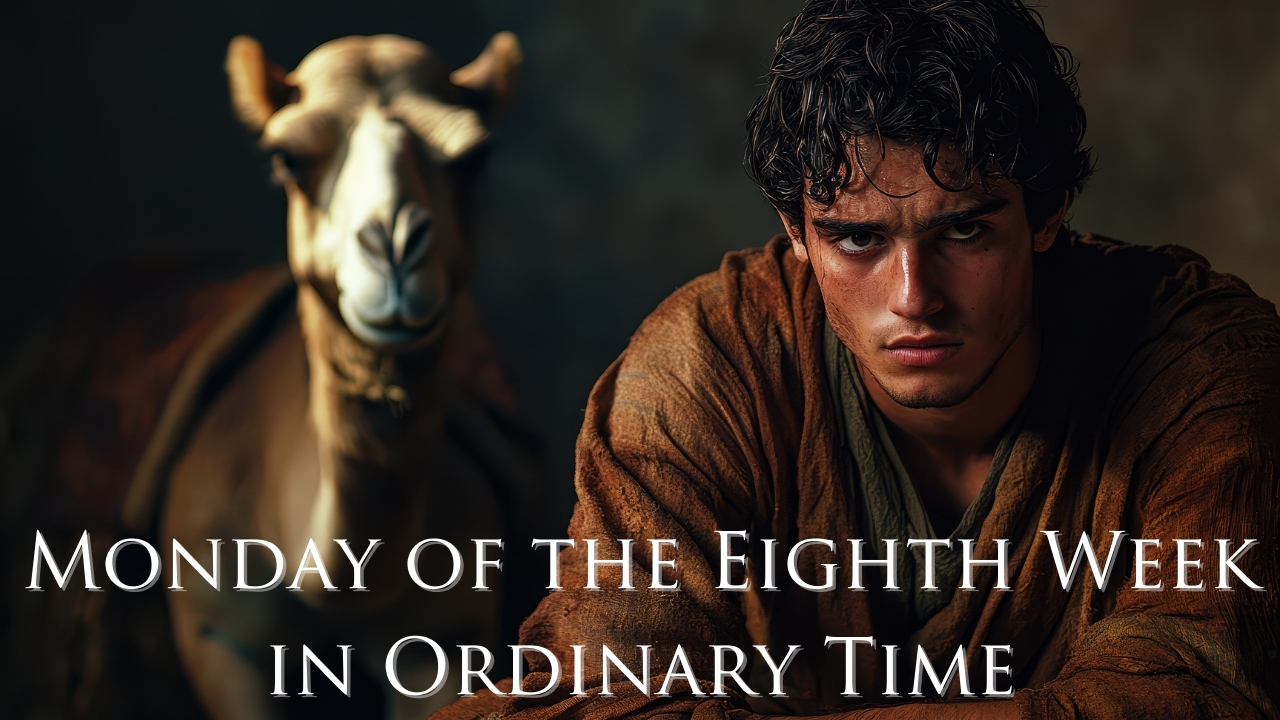When the Strongest Fail: Finding Hope in Human Weakness | Daily Readings | April 15, 2025

“One of you will betray me.” With these words, Jesus revealed not just Judas’s coming betrayal but the moral frailty in each of us. Today’s powerful Holy Week reflection explores how divine strength emerges precisely through human weakness.
Through this reflection, you’ll discover:
- Why the disciples who knew Jesus best still failed him in the crucial moment
- How our own tendencies toward betrayal and denial can become doorways to grace
- The profound difference between Peter’s tears and Judas’s despair
- Why God’s glory shines most brightly against the backdrop of human failure
Readings covered: Isaiah 49:1-6; Psalm 71:1-6, 15, 17; John 13:21-33, 36-38
Perfect for anyone grappling with past failures, struggling with shame, or seeking deeper meaning in the paradoxes of Holy Week.
#HolyWeek #HolyTuesday #DivineMercy #RestoredByGrace #PeterAndJudas #HumanWeakness #ServantSong
When the Strongest Fail: Finding Hope in Human Weakness
“One of you will betray me.”
The words fell like stones into still water, sending ripples of confusion and fear across the table. Eyes darted from face to face. Whispered questions passed between the disciples.
“Surely not I, Lord?”
In that moment of accusation, none of them—not even Judas himself—stood up and said, “Yes, I am the betrayer.” The possibility seemed unthinkable. Yet within hours, not just one but all would fail their Master in various ways.
Judas would betray with a kiss. Peter would deny with curses. The rest would abandon him to face death alone.
How could those closest to Jesus—those who witnessed his miracles, heard his teachings, broke bread with him daily—collapse so completely at the critical moment?
As we move deeper into Holy Week, today’s readings confront us with the sobering reality of human weakness alongside the astonishing promise of divine strength. They reveal both the frailty of our most confident commitments and the unshakable faithfulness of God that transcends our failures.
The Gospel scene is intimate yet ominous. The Last Supper has begun. Jesus, “deeply troubled,” announces a betrayal from within his innermost circle. When pressed, he identifies the betrayer by sharing bread with him—a gesture of friendship that tragically highlights the intimacy of the coming betrayal.
Then John tells us simply, “After Judas took the morsel, Satan entered him.” What began as gradual compromise ends in complete possession. Judas steps into the night, both literally and spiritually, as darkness engulfs his soul.
Yet even as this betrayal unfolds, Jesus makes a startling declaration: “Now is the Son of Man glorified, and God is glorified in him.” How can betrayal lead to glory? How can the darkest human failure become the stage for divine radiance?
Before we can absorb this paradox, another failure is foretold. Peter—bold, confident Peter—declares his willingness to lay down his life for Jesus. But Jesus knows better: “Will you lay down your life for me? Amen, amen, I say to you, the cock will not crow before you deny me three times.”
The one who seemed strongest would prove weakest. The rock would crumble. The sword-wielding defender would soon claim, “I do not know the man.”
These predictions must have been devastating to the disciples. Yet today’s first reading from Isaiah offers a different perspective on apparent failure: “Though I thought I had toiled in vain, and for nothing, uselessly, spent my strength, yet my reward is with the LORD.”
Here the servant experiences what feels like complete failure—effort without result, strength spent without purpose. Yet this seeming defeat becomes the very context for God’s greatest work: “I will make you a light to the nations, that my salvation may reach to the ends of the earth.”
Our psalm reinforces this theme of divine strength perfected in human weakness: “In you, O LORD, I take refuge… Be my rock of refuge, a stronghold to give me safety.”
The psalmist doesn’t claim personal strength but rather acknowledges complete dependence: “For you are my hope, O Lord; my trust, O God, from my youth. On you I depend from birth; from my mother’s womb you are my strength.”
Together, these readings reveal a profound truth at the heart of Holy Week: God’s greatest victory comes through what appears to be devastating defeat. The servant’s seeming failure becomes light to the nations. The disciples’ collapse becomes the backdrop for resurrection faith. The cross itself—history’s greatest injustice—becomes salvation’s masterpiece.
What does this mean for us today?
First, these readings invite brutal honesty about our own capacity for failure. We like to think we would have been different from Judas and Peter. We tell ourselves we would have remained faithful when others fled. But Holy Week confronts us with a harder truth: we too betray, deny, and abandon Christ through our actions and inactions.
Sometimes we’re like Judas—gradually compromising our integrity until a complete moral collapse seems almost inevitable. The gap between our Sunday worship and Monday ethics grows until hypocrisy becomes our native language.
Other times we’re like Peter—overestimating our spiritual strength, making grand promises we can’t fulfill, then collapsing at the first real challenge. Our confidence proves to be self-confidence rather than God-confidence.
The first step toward Holy Week transformation is admitting this uncomfortable reality. We are not the heroes of this story. We are the ones who flee, who deny, who betray.
Yet—and this is crucial—our failures are not the end of the story, just as they weren’t for Peter. While Judas despaired and ended his life, Peter wept bitter tears and later experienced restoration. The same moral frailty led to radically different outcomes because of how each responded to his own failure.
Judas could not imagine grace large enough to cover his betrayal. Peter, despite his collapse, somehow maintained a thread of hope that relationship could be restored. This thin line between despair and repentance makes all the difference.
Second, these readings reveal how God works through human weakness rather than human strength. The servant in Isaiah discovered that apparent failure became the very context for God’s global purposes. Peter’s shattered self-confidence created space for authentic God-confidence to grow. The disciples’ total collapse set the stage for resurrection faith that could never again be based on their own adequacy.
We spend so much energy trying to appear strong, competent, and put-together. We hide our struggles, mask our doubts, and pretend we’re better than we are. Yet what if, like the psalmist, we acknowledged radical dependence instead? “On you I depend from birth… you are my strength.”
What if our weakness became a doorway to genuine strength? What if our failures created space for grace that self-sufficiency never could?
The third and most astonishing insight from today’s readings is how divine glory shines precisely through human failure. “Now is the Son of Man glorified,” Jesus declares right after Judas departs to betray him. The worst human treachery becomes the backdrop for God’s greatest revelation.
This paradox reaches its zenith on Good Friday. The moment of apparent defeat—the Son of God dying between criminals—will reveal divine love more clearly than any miracle or teaching ever could. What seems like failure in human eyes becomes victory in divine perspective.
As Holy Week progresses, we’re invited to ask ourselves uncomfortable questions: Where are we most vulnerable to betraying Christ? What pressures might cause us to deny him? What self-interest might lead us to flee when faithfulness becomes costly?
These aren’t questions to induce shame but to cultivate humble dependence. Only when we acknowledge our frailty can we properly welcome the strength Christ offers.
Peter’s story offers particular hope. After his spectacular failure, Jesus specifically named him in the resurrection announcement: “Go and tell his disciples and Peter that he is going ahead of you to Galilee.” Then came the threefold restoration by the lakeshore, where Peter’s three denials were met with three opportunities to affirm love.
The one who failed most publicly was restored most tenderly. His weakness became the very territory where grace operated most powerfully. The broken rock was made whole to become the foundation for others.
For those carrying shame from past failures—moral collapses, abandoned commitments, betrayed trust—Peter stands as living proof that our worst moments need not define us. Christ’s restoration power exceeds our capacity for failure.
Yet we must also reckon with Judas, who reminds us that while no failure places us beyond grace’s reach, our response to failure makes all the difference. Despair closes the door that repentance would keep open.
As we continue this Holy Week journey, may we have courage to face our own capacity for betrayal without excusing it or despairing over it. May we, like the psalmist, build our lives not on personal adequacy but on the “rock of refuge” that never fails. And may we discover, paradoxically, that the places of our greatest weakness become the spaces where divine light shines most brightly.
For the glory revealed in Holy Week is unlike any other—not the dazzling glory of uncontested strength, but the deeper glory of love that remains faithful even when we fail, of light that shines most brightly against the backdrop of darkness, of salvation that reaches the ends of the earth precisely through the servant’s apparent defeat.






